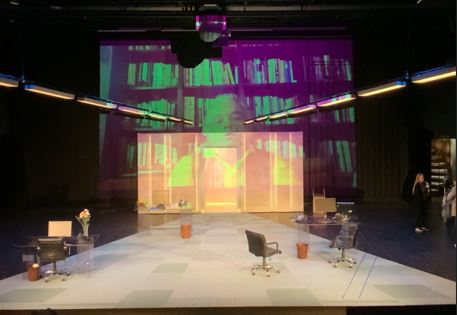Bayes research highlights sustainability and climate change during performance of The Lehman Trilogy
Professor Bobby Banerjee worked with Swedish director Carolina Frände to feature in acclaimed performance of the show.
The impact of Bayes Business School research is being felt by theatre-goers in Sweden following a recent production of award-winning show The Lehman Trilogy.
Professor Bobby Banerjee was approached by Carolina Frände in November 2021 following a seminar he had given at the University of Stockholm on a recent study, titled ‘Sustainability in the time of Corona’. Such was the impact of Professor Banerjee’s words that, Ms Frände approached him with the idea of collaborating in her upcoming performance of Stefano Massini’s epic production.
The play describes the life of the Lehman Brothers, who rose from obscurity to create a global financial services firm in the USA which ultimately triggered the 2008 global financial crisis.
Professor Banerjee’s talk also encompassed the idea of corporate capitalism and the political economy of climate change, and he said he could immediately see similar themes running through the play. The two began to speak and five months later, Professor Banerjee’s lecture has opened and closed 35 performances of Ms Frände’s critically acclaimed play in Stockholm.
The audience reaction to Ms Frände’s production has included plaudits from more than just theatre critics and seen a more diverse group of attendees. She said she was pleased to have met Professor Banerjee, albeit via Zoom, in those fortuitous circumstances.

“Bobby and I don’t really know one another,” laughed Ms Frände, a PhD student at Stockholm Business School and theatre and artistic director for 25 years. “I was advised to listen to Bobby’s talk and wanted ideas to tell what I believed what a story of corporate capitalism. It was clear to me that Bobby’s talk was spot on. I had been searching for how to bring this story into the acute times of now and anchor it outside of itself. While the climate question is not represented in the play there are other existential questions that needed to be answered.
“It was important to me to integrate all these different stands in the play. Because of collaborations like this with people like Bobby, I can see more possibilities. I wanted to ask concrete questions of the audience and implement different ideas of artistic direction – having Bobby there allowed this.”
It is not the first time the research of Professor Banerjee, Associate Dean of Research at Bayes, has featured in the creative arts sector. In December 2009 a project on ‘The Law of Capital: Histories of Oppression” was curated in an art exhibition at the Gallery of Contemporary Art, Slovenia, and he says it is important these partnerships continue to push the boundaries of what is expected in the cultural and creative industries and academia.
“Having spoken to Carolina, I could immediately see the relevance between my research and her production, and how it can make visible what is silent in the play,” said Professor Banerjee, whose face is the first seen during the production, as well as the last. “Climate change is happening now. Annual global carbon emissions fell during the 2008 financial crisis and again in 2020 when the pandemic began. How we organise our economy has social and environmental consequences that has led to the climate emergency the world is facing today.”
“Collaborations outside the box are essential as it broadens the horizon of the audience. Yes, I work in a business school, but I see my role as not just educating the next generation of CEOs but also the next generation of environmental activists, political leaders, policy makers, and thought leaders.
Ms Frände is now planning a trip to London to explore future collaborations, having trialled different ideas during her production, including using the juxtaposition of rising temperatures and the Dow Jones Index peaking to point to impending trouble.
“Bobby is part of an age where people run faster,” she said. “In the show, we project his recorded Zoom presentation. Zoom has become a real time phenomenon during the pandemic, and I wanted that live presence.
“While making theatre in Sweden can be limiting because of the language, it was clear that we opened the theatre as an area of debate. I want to continue to work with academia – especially on issues relating to social and environmental responsibility – and develop this further. We must learn from each other.”
Professor Banerjee’s paper ‘Sustainability in the time of Corona’ can be viewed here.
Ends
